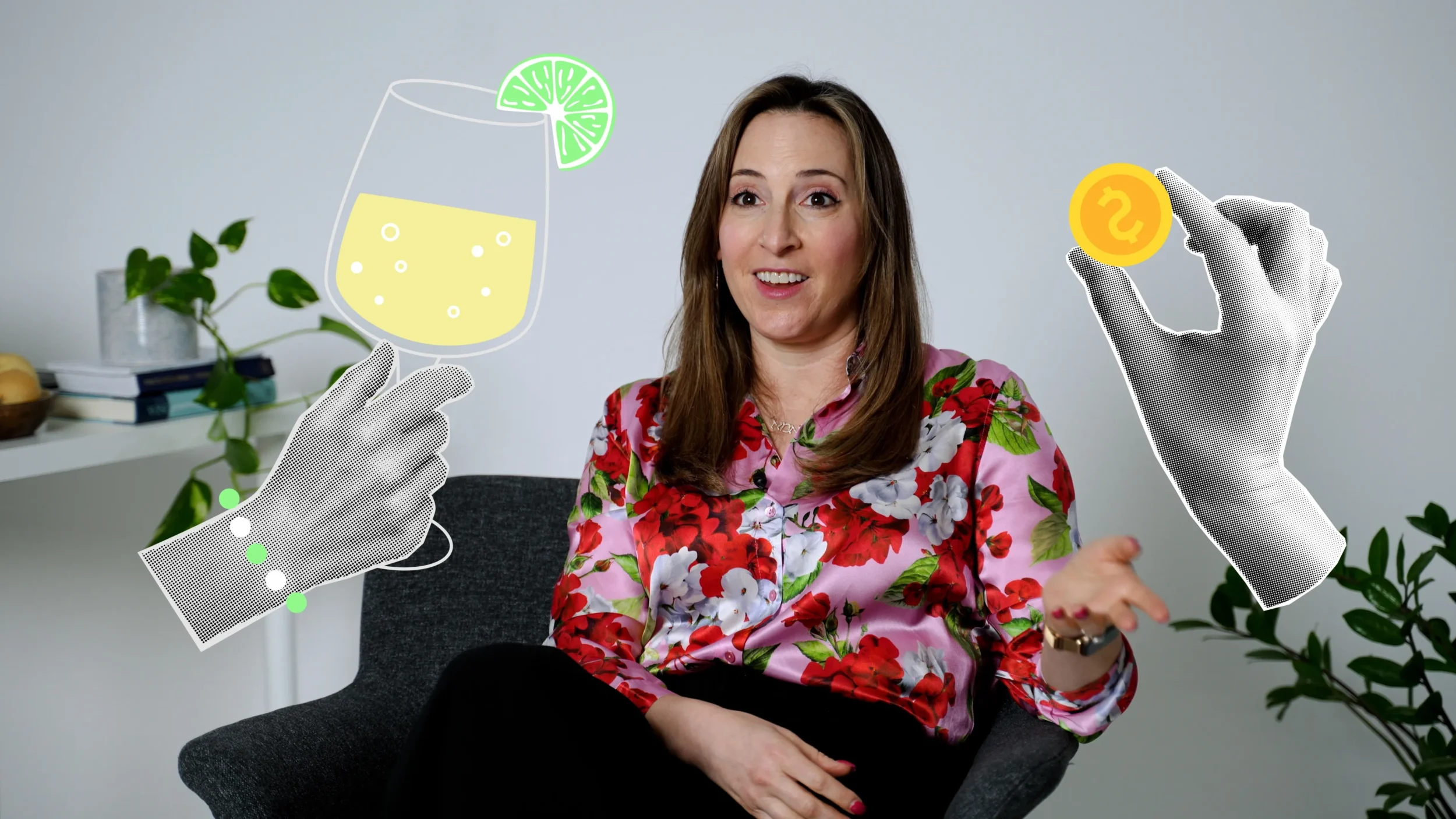Fed5: Campfires to Courage—Jewish Atlanta is Showing Up
We offer a variety of newsletters tailored to your interests, from community events and volunteer opportunities to advocacy updates and Jewish holiday celebrations. Whether you’re looking for inspiring stories, ways to get involved, or the latest news, our newsletters deliver content straight to your inbox. Sign up and be part of a vibrant and engaged Jewish Atlanta!
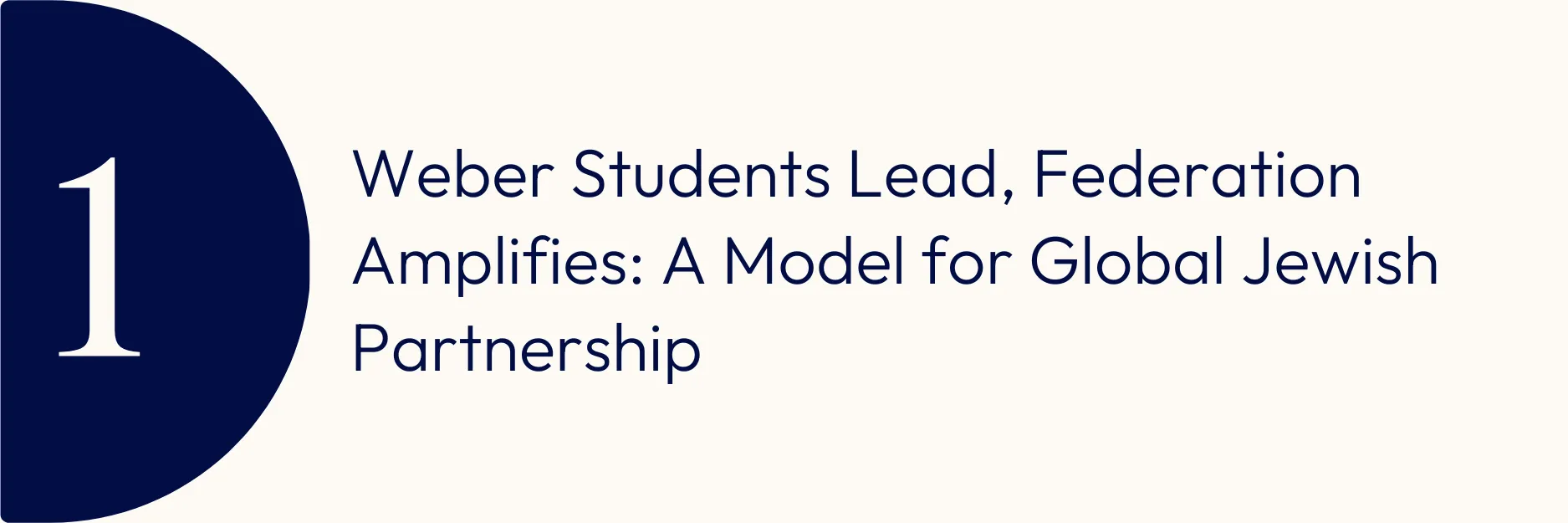
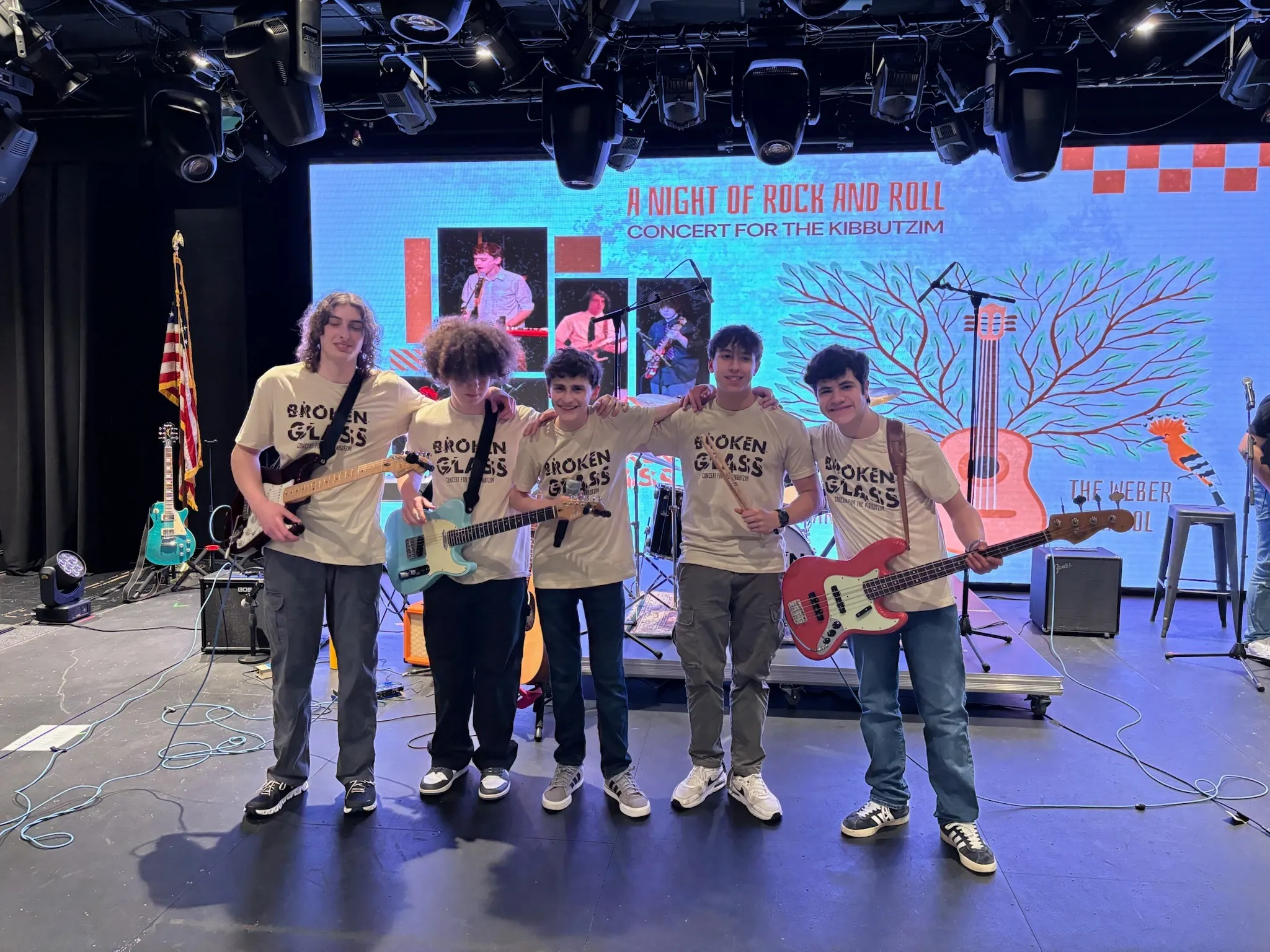
In the months following October 7th in Israel, students at The Weber School raised over $100,000 to support two devastated kibbutzim—Nahal Oz and Nir Oz—proving that when youth are empowered, and community partnerships are strong, extraordinary impact is possible.
When the “Concert for the Kibbutzim” that Weber students organized to raise these funds ended in March, their work didn’t stop there. It evolved into a long-term fundraising campaign. They continued to raise money at school events, and the campaign became a cornerstone of the school’s message about leadership, identity, and global responsibility throughout the remainder of the school year.
The initiative earned a generous $50,000 matching grant from The Marcus Foundation. This initiative was deeply rooted in The Weber School’s values, nurtured by strong Jewish education and amplified through its connection to the Jewish Federation of Greater Atlanta’s partnership region in Israel, Yokneam Meggido.
Eliad Eliyahu Ben Shushan, Partnership Director Yokneam & Meggido- Atlanta & St. Louis, shares the perspective from Israel: “Since October 8th, just one day after the attacks, the Jewish Federation of Greater Atlanta began supporting evacuees from Nahal Oz—one of the hardest-hit communities—who were evacuated to Kibbutz Mishmar HaEmek, within our Partnership region. At a time when the entire country was in shock, the Partnership region, along with the Atlanta and St. Louis Federations, were among the first to extend a hand.”
Nahal Oz was among the hardest-hit communities on October 7th. Many students in Weber’s partnership school in Yokneam Meggido now include evacuees from nearby Nahal Oz, making the connection profoundly personal.
“As a result of visits by members of the Nahal Oz community organized by Jewish Federation of Greater Atlanta and the P2G partnership, and ongoing work with partner schools in Yokneam-Meggido, our students know the names and stories behind the tragedy,” said Rabbi Ed Harwitz, Head of School at The Weber School. “While fundraising in support of Israel, they are also supporting their extended family.”
As Rabbi Harwitz emphasized, the project wasn’t a top-down initiative—it was student-driven and community-backed. Federation’s role was essential in making sure that every dollar raised reached the right places quickly and effectively.
“The students led with heart, and Federation ensured the infrastructure, partnerships, and accountability were in place to turn their passion into lasting impact,” said Rich Walter, Federation’s Chief Impact Officer. Federation’s allocations team was at the ready to help send the students’ fundraising dollars.
In Nir Oz, the money will help support displaced families who chose to rebuild their lives together in a new community, instead of relocating. These families were among the first recipients of the students’ generosity.
In Nahal Oz, Eliad says the funds raised by the teens at Weber will be stewarded by teens, and they hope to land with poetic purpose. “The leadership of Nahal Oz made a remarkable decision to include the local teens in choosing how the donation will be used. This empowers them and sends a strong message that their voices matter. While the final decision will depend on the timeline for their return to the kibbutz—still uncertain given the security situation near the Gaza border—early discussions are leaning toward something musical, such as helping to rebuild the kibbutz’s beloved music studio.”
As Rabbi Harwitz described, the power of this partnership goes beyond philanthropy. He recently returned from a visit to Israel, where conversations began around a future collaboration between Weber’s student musicians and their peers at Nahal Oz
“It’s about closing the circle,” Rabbi Harwitz said. “These students raised the funds, and now they’re working on reconnecting with those who benefit from them. This is a powerful story of partnership in service of Jewish peoplehood.”
The effort demonstrates Federation’s impact area of supporting Israel and Jews worldwide—not just in moments of joy, but in times of grief, trauma, and rebuilding. Because of the long-standing partnership with Yokneam Meggido, Federation was able to move the funds swiftly and intentionally.
Atlanta Jewish community leaders view this initiative as a shining example of what happens when core Jewish institutions—Federation, schools, philanthropists, educators, teens, and more—united in a shared vision.
And Rabbi Harwitz believes this could be a prototype for growing leaders starting in high schools that could be used around the country. “At just 15, 16, and 17 years old, these teens have come to understand their influence and power—learning how to work alongside major philanthropists and our local Federation to create real impact. They are also engaging with our partnership region in a way that reflects Atlanta’s uniquely strong and personal approach. Through this experience, they gained a deep understanding of how Jewish community, leadership, and generosity come together—and just how big a role they can play.”
“This is exactly why we invest in Jewish education and why partnership matters,” Rich added. “When a crisis hits, these relationships—built over years—allow us to act, not react.”
“The Federation’s strong presence in Israel has been key. It allowed us to act immediately and ensure that help arrived where it was most needed. This model of direct connection enabled us to respond from day one,” Eliad adds.
As Rabbi Harwitz put it, “These teens didn’t wait until college to assume leadership. With Federation’s support, they are taking leadership right now—here and in Israel.”
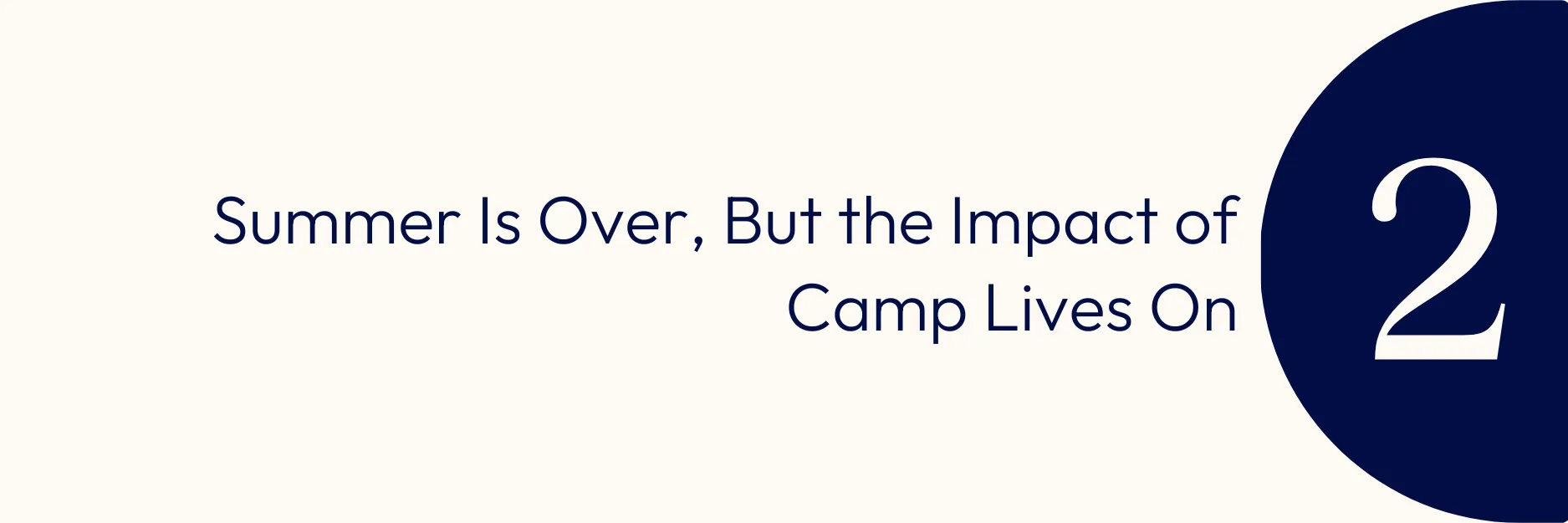
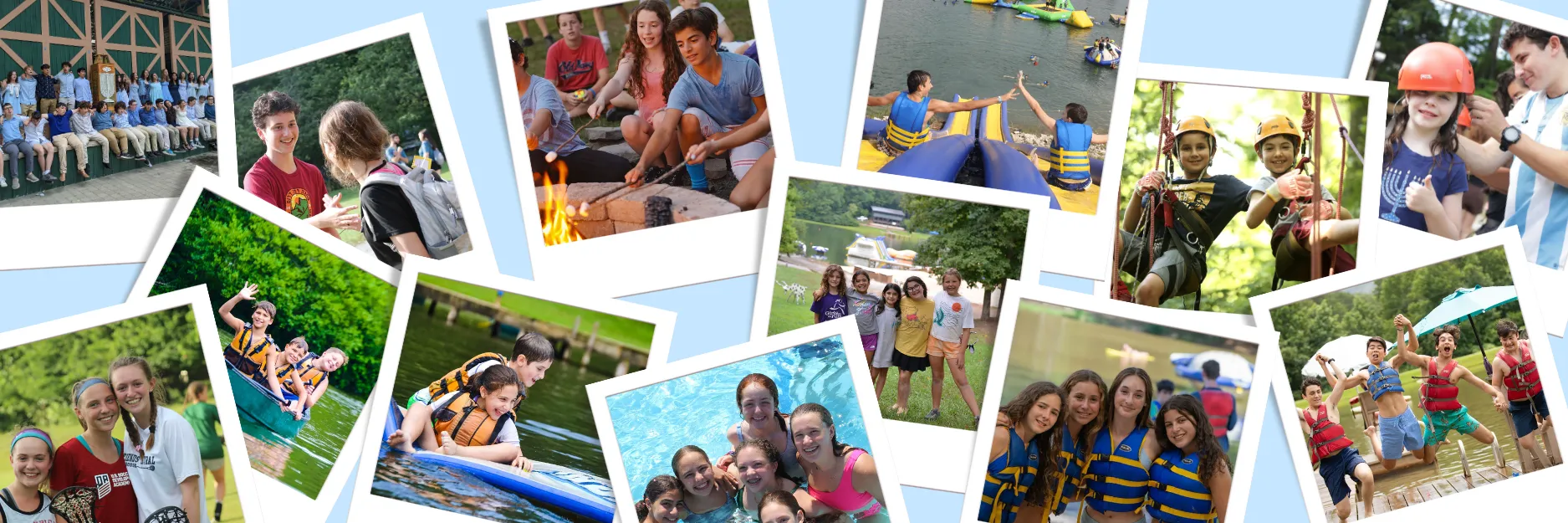
The final buses are soon heading out and the echoes of Havdalah songs will fade into the warm August air. And with that, another unforgettable summer is coming to a close at our Federation-supported Jewish overnight camps: Camp Barney Medintz, Camp Ramah Darom, Camp Judaea, URJ Camp Coleman, and URJ 6 Points Sports Academy.
This summer wasn’t just filled with adventure, friendship, and ruach (spirit)—it was a season of resilience, pride, and powerful Jewish moments that will ripple long after the tents are packed away.
Thanks to the generosity of donors like you, more than 840 Atlanta area children were able to attend Jewish overnight camp with the help of scholarships and grants. For many of these campers, this summer marked their first immersive Jewish experience—a foundational moment in their Jewish journey.
“Nothing is more fulfilling than seeing a first-time camper’s life changed due to this experience,” said Leah Stinson, Federation’s JCamping Manager. “These camps aren’t just fun—they shape Jewish identity in ways that last a lifetime.”
In response to the alarming rates of antisemitism across our country, Federation invested $104,000 in security upgrades to ensure a safe and secure environment across our local camps. And in a powerful show of global Jewish solidarity, 20 Israeli campers joined Camp Barney Medintz through a partnership with The Jewish Agency for Israel (JAFI), bringing Israeli perspectives and personal stories into the heart of the summer experience.
Despite the ongoing crisis in Israel this summer—including the Iranian missiles—dozens of Israeli shlichim (emissaries) still came to work at our camps. Their presence infused each camp with a living connection to Israel and served as a symbol of strength and togetherness during uncertain times.
This summer, each camp created unforgettable memories and meaningful moments. Check out a few examples:
- At Camp Coleman, the oldest campers in Bonim (11th grade) were paired with the youngest in Chalutzim (2nd–3rd grade) for a special buddy program. As they played games and celebrated Shabbat together, they built bonds that transcended age and reminded everyone that Jewish leadership begins with connection.
- At Camp Judaea, Chalutzim (10th grade) campers rolled up their sleeves and got to work with NECHAMA – Jewish Response to Disaster, helping rebuild homes damaged by Hurricane Helene in North Carolina. Over 100 members of the CJ community have volunteered with NECHAMA since the storm, showing what it means to live Jewish values through action.
- At URJ 6 Points Sports Academy, Tikkun Olam Day of Service took on new meaning as campers packed 100 backpacks and 300 hygiene kits for local families in partnership with Eblen Charities—and ran a 5K to raise awareness and funds.
Our camps are more than a summer destination—they’re incubators for Jewish pride, leadership, and lifelong community. And it’s all made possible by your support of Federation’s Annual Campaign.
As we enter the new school year and High Holy Day season, we carry with us the energy of a summer well spent and the stories of campers who laughed, learned, grew, and led with Jewish joy.
Thank you for being part of the magic.
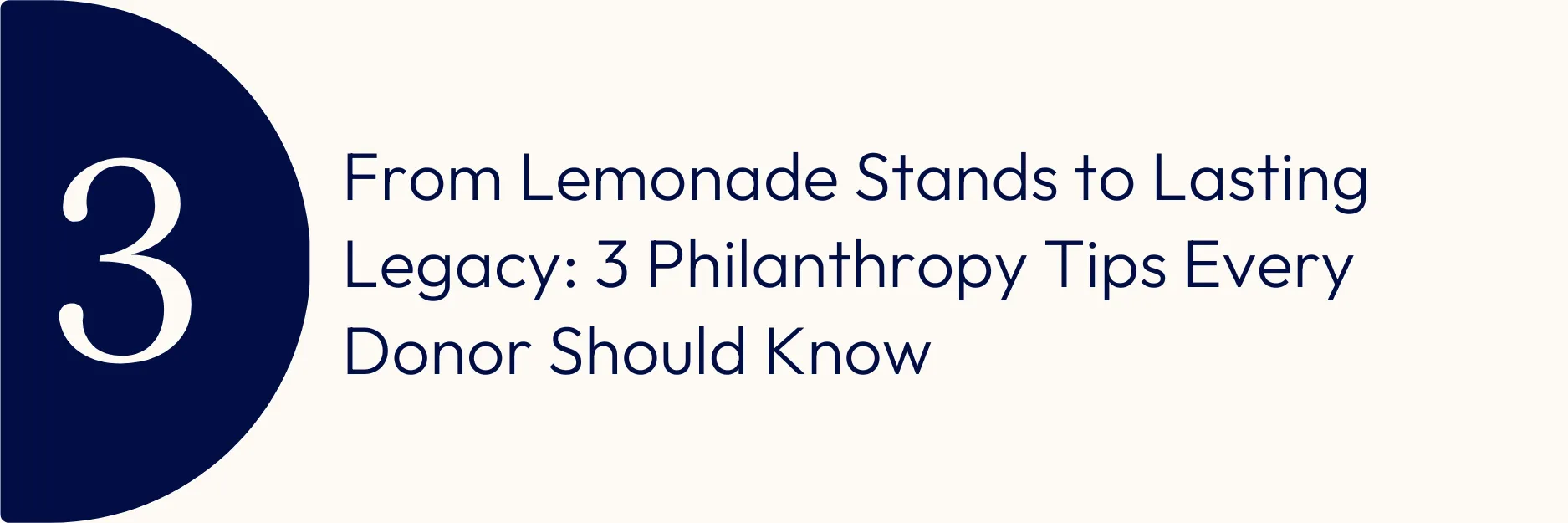
Remember when giving back felt simple? Maybe it was a few coins in a Tzedakah box, or the proceeds from a lemonade stand. These early moments often spark a lifelong journey of generosity. But today, with so many causes to support and so many ways to give, philanthropy can feel overwhelming.
That’s exactly why Lemonade With Lindsay was created.
In this new video series, Lindsay Kopecky, Frances Bunzl Chief Advancement Officer at the Atlanta Jewish Foundation, draws on over a decade of experience helping individuals, families, and organizations align their giving with their values. Her goal? To make philanthropy meaningful, impactful, and yes – simple and sweet, like selling lemonade.
In Episode 1, Lindsay shares three essential tools that can take your giving to the next level:
- Know Your Values
Lindsay recalls a formative moment at nine years old, when she used her Hebrew School snack money to buy lunch for a person in need, out on the street. When she came home and told her father what she had done, he teared up and said, “Lindsay, I am so proud of you.” That moment lit a spark that shaped her philanthropic path – and serves as a reminder that the values that move us emotionally often point to the kind of change we want to create in the world.
“What are the issues you talk about around the dinner table?” Lindsay asks. “What are the moments in your life that filled you with pride, that filled your parents with pride? What do you hope to inspire in your children?”
Answering these questions is the first step toward intentional, lasting, and heart-centered giving.
- Build the Right Team
Once you’ve identified what matters most to you, surround yourself with the people and partners who can help bring your vision to life. “When people work with the Atlanta Jewish Foundation,” Lindsay shares, “they often say it feels like coming home – because our team understands and lives the same values that you do.”
With over $59 million granted last year to more than 1,300 organizations, including those serving Atlanta’s Jewish community, Israel, and global causes, the Atlanta Jewish Foundation helps donors maximize both impact and meaning.
Whether you’re giving as an individual or engaging your entire family across generations, remember that philanthropy takes a village, and the right philanthropic partners can turn your values into action.
- Start Now
“You don’t have to be rich to be a philanthropist,” Lindsay reminds us. Just as it’s wise to start investing early, the same is true for charitable investments. With tools like Donor-Advised Funds and endowments, you can make a meaningful impact today while planning for the future and allowing your giving to grow over time.
Often, people give reflexively – waiting for a crisis or campaign to donate to. But having your philanthropy structured and ready enables you to respond more effectively and intentionally. As Lindsay notes, “After October 7th, our donors were able to quickly deploy the resources they had already set aside to support the causes they cared most about.”
Whether you’re just beginning your philanthropic journey or looking to deepen your impact, the time to start is now.
🍋 Watch Episode 1 of Lemonade with Lindsay to hear more insights and practical tools to do good.
Ready to explore your own giving goals? Connect with the Atlanta Jewish Foundation today.
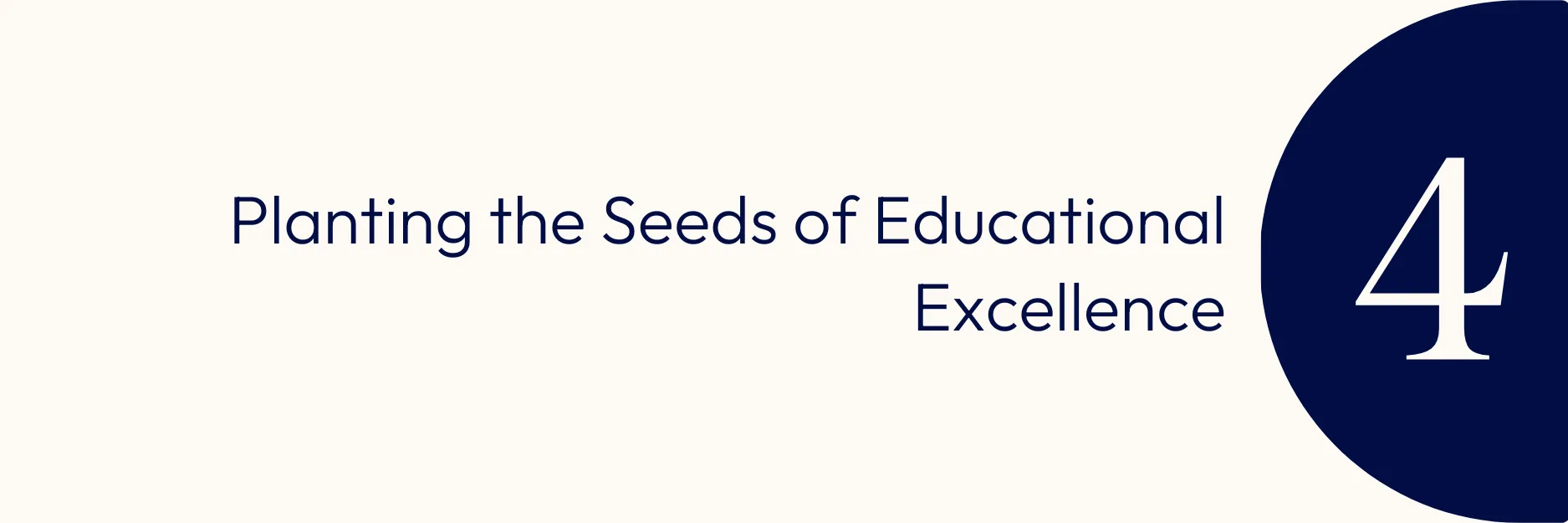
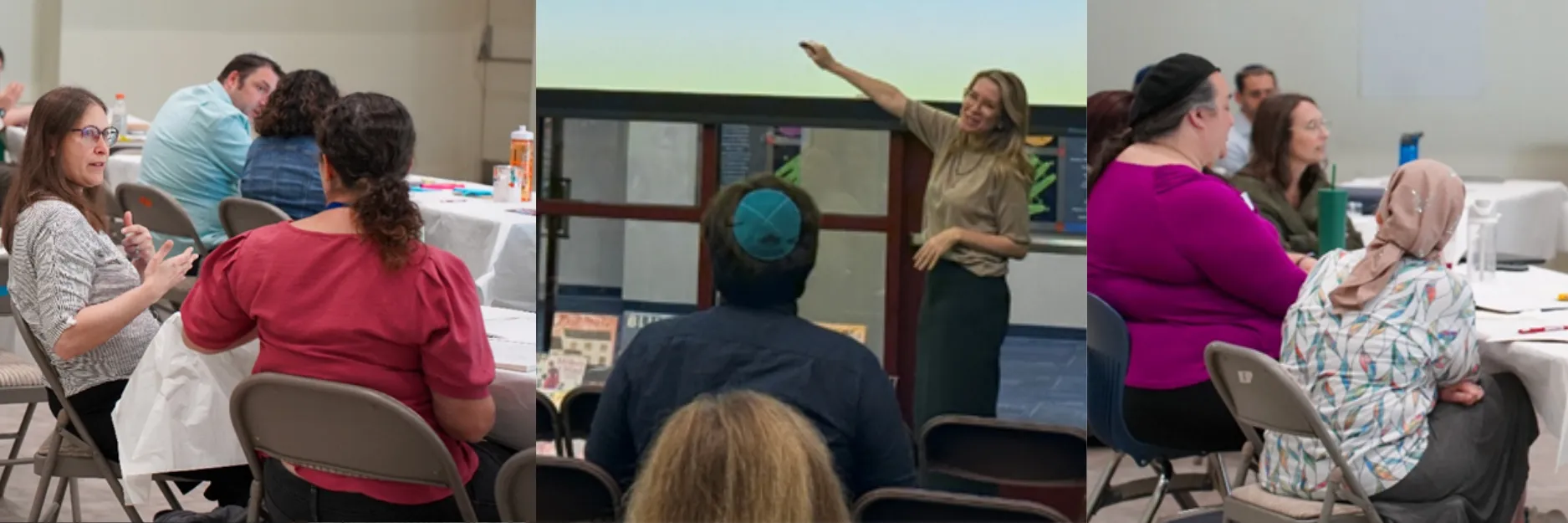
When the Jewish Federation of Greater Atlanta launched the SEEDS Grant (Supporting Excellence in Education in Day Schools) in November 2024, it planted more than just an acronym. It planted an idea—that increasing targeted, high-quality professional development for educators is essential to cultivating excellence in Jewish education.
In its first year alone, the SEEDS Grant provided over $38,000 to five Jewish day schools, allowing them to deliver transformative training to faculty on topics like emotional regulation, meeting the needs of diverse learners, and Hebrew language instruction. Now in its second year, the program is expanding—$51,000 in grants have already been awarded to six schools for the 2025–26 school year.
Shelley Fogelson, Manager of Day School Relations and former day school teacher and principal, says, “Teaching is a dynamic field— Teaching practices, curriculum content, technologies, and standards are constantly evolving. While all of our day schools are committed to providing professional development, we understand that this can be expensive. We wanted to help schools shoulder the burden through the creation of the grant.”
The SEEDS Grant is one of the clearest examples of how the Federation is investing in its impact area of Jewish education by supporting the very people who shape it: the educators. With up to $10,000 per school (and up to $12,000 for collaborative efforts), the grant alleviates financial strain and enables schools to pursue training that might otherwise be out of reach.
“High-quality professional development is costly,” said David Welsher, Associate Head of School at The Epstein School. “But with support like SEEDS, we’re able to invest in the kind of training that makes a real difference for both teachers and students.”
“Federation is committed to supporting day schools in their critical role of educating our children. The SEEDS grants directly impact teachers, ensuring that they refine their practices and have the tools to provide the highest quality educational experience for the 2,100 students currently enrolled in our day schools,” Shelley adds.
Unlike one-off workshops that quickly fade from memory, SEEDS-funded initiatives are designed to be sustained, collaborative, and directly tied to student needs. They allow teaching teams—not just individuals—to grow together through coaching, peer dialogue, and implementation of new practices throughout the year.
“We developed the SEEDS grant according to research on effective adult learning and professional development – when learning is collaborative in nature and ongoing it leads to deeper learning, sustained growth, and improved outcomes for both educators and students,” says Shelley.
Schools have used SEEDS funding to help address everything from neurodivergent learning needs to social-emotional resilience.
“For seasoned educators, it was refreshing to unite around a shared focus,” said Polina Nagla, Assistant Principal at Temima. “We believe the strides we’ve made this year are just the beginning—and we’re hopeful that the seeds we’ve planted will take root, grow, and eventually bear fruit.”
The SEEDS Grant is also a testament to Federation’s commitment to long-term strategic vision. The program was created just months after hiring Shelley Fogelson as Manager of Day School Relations—a new role designed to strengthen partnerships across schools, support innovation, and align resources with school needs.
“When I started, I spent time networking with professionals in similar positions in Federations around the country. I wanted to hear what other communities were doing to support and partner with their day schools and professional development was a recurring theme,” Shelley says.
In this way, the SEEDS initiative not only uplifts individual educators—it strengthens the entire ecosystem of Jewish day schools in Atlanta. It’s a smart investment in the future of Jewish identity, values, and learning.
And it’s a prime example of responsible donor stewardship. Every dollar granted through SEEDS is used for scalable, measurable professional development that schools must evaluate and report on at year’s end. These insights help ensure long-term accountability and impact.
Shelley adds, “We have a wonderful lay committee of seasoned educators who carefully read each SEEDS grant application, ask thoughtful questions, and discuss the impact of each proposal on teaching and learning.’
As the SEEDS Grant continues to grow, its effect is already visible in classrooms across Atlanta—where students benefit every day from better-prepared, better-supported educators. Federation’s support doesn’t just help teachers teach. It helps students thrive—and that’s a harvest worth celebrating.
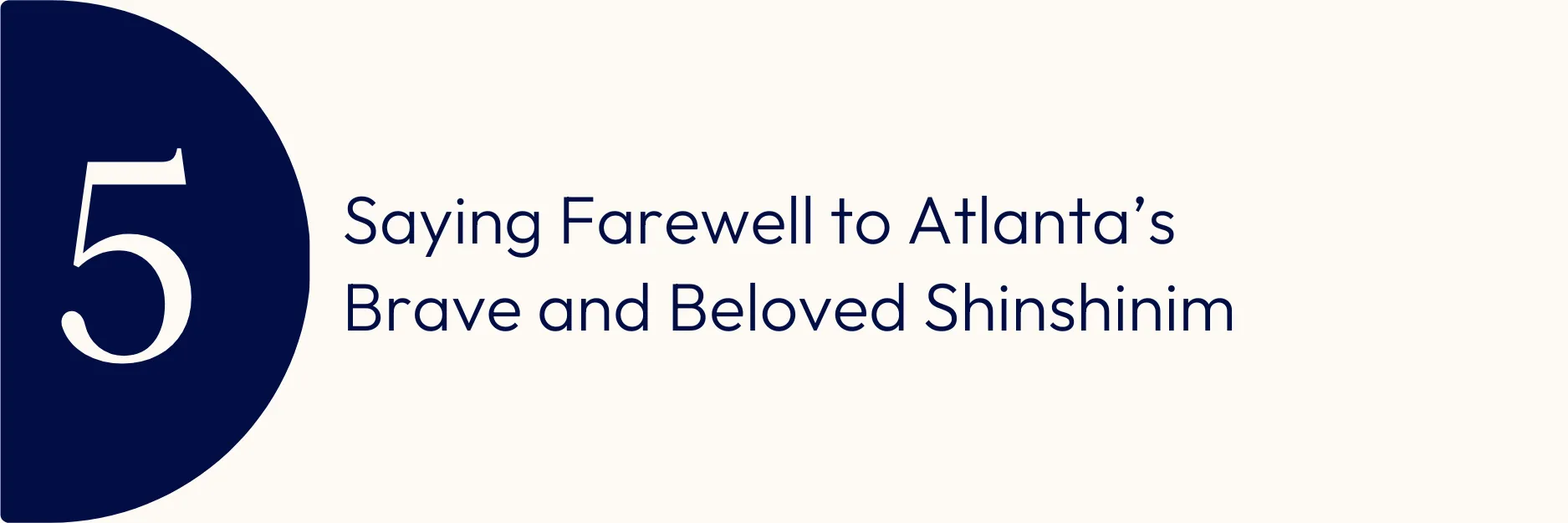
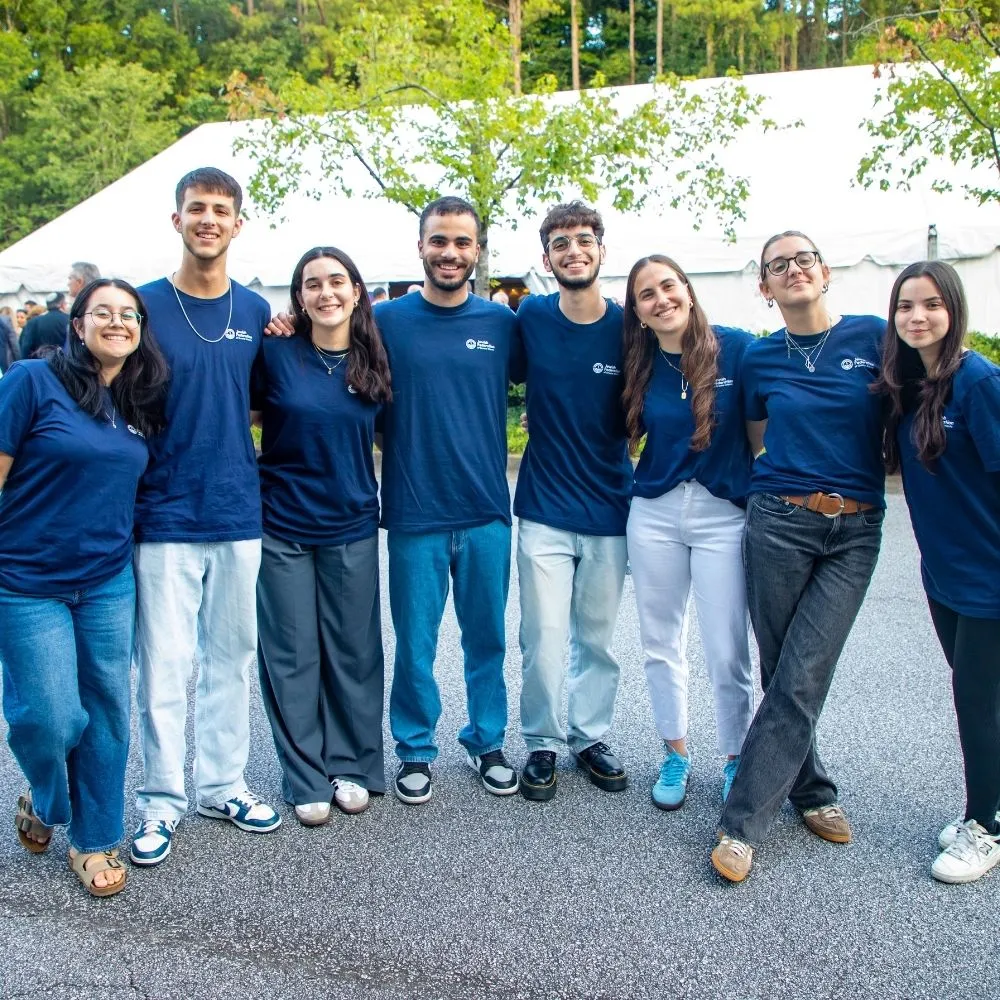
As Atlanta’s Jewish community prepares to bid farewell to this year’s cohort of Schoenbaum Shinshinim, we reflect not only on their tremendous impact but also on their remarkable courage and commitment.
The Shinshinim program, a partnership initiative between the Jewish Federation of Greater Atlanta and the Jewish Agency for Israel (JAFI), brings a select group of Israeli high school graduates to our community for a gap year of service before entering the Israel Defense Forces. During this year, they serve as a living bridge between Israel and Jewish Atlanta, fostering connections through Jewish education and deepening our global Jewish identity—impacting Federation’s focus areas of Jewish Education and Israel and Jews Worldwide.
What made this cohort uniquely special was their decision to continue with the program after October 7th, when war broke out in Israel. Jenn Handel, Director of Israel Engagement, emphasized the weight of that choice:
“This group applied before the war, when life looked very different. After October 7th, they had to make a conscious decision—do they stay home and prepare for army service with their peers, or do they come to Atlanta and serve in a different way? They chose to come, and that says so much about their character.”
Now, as they prepare to return home and begin their military service—some drafting just three weeks after landing in Israel—the community honors their ommittment and their contributions.
Some of the Shinshinim shared memories that highlight the transformative power of this year.
For Amit, it was the warmth of his first Rosh Hashanah in Atlanta:
“I was so homesick until we started eating. I had given my host mom a special Yemeni spice, and she made the chicken soup I grew up with. When we ate, I started crying. That’s when I knew—they weren’t just my host family. They were my family.”
Adi reflected on how the year shaped her confidence and independence:
“My biggest success was learning how to do ‘schmoozing’—entering a new place with confidence and meeting new people. I learned I can be independent and manage anywhere.”
She also cherished her birthday celebration:
“My host family asked my mom for the recipe of my favorite cake. It was one of the most emotional things that happened to me this year.”
Nadav found meaning through teaching and community:
“Being a counselor at Camp Ramah Darom and in my schools, I felt I was able to bring the Israeli spirit and values I grew up with to the next generation.”
He added,
“The love Atlanta’s Jewish community has for Israel and the Shinshinim is overwhelming. There are people across the ocean who care about us, who want the best for Israel, and who truly love Israel. That’s something I’ll carry with me forever.”
For Yali , helping students prepare for Israel advocacy was a highlight:
“One of my biggest successes this year was in the LFT program of AJC, preparing high school students to engage in advocacy. I felt I was able to convey the Israeli story and create an authentic connection.”
He also shared the powerful support he felt from his host family:
“On Israeli Independence Day, far from home, my host family celebrated with me at a community event. Together, we showed support and solidarity with Israeli music in the background.”
Gili emphasized the deep connections she built:
“My biggest success was building personal connections and feeling at home—even when I was more than 10,000 kilometers away from home. I was surprised by how much the community truly cares about Israel.”
A small but meaningful tradition became her favorite memory:
“Every day off from camp, my host family took me for ice cream because they knew how much I loved it. It became our special time together.”
Gili also reflected on what she will carry home:
“I learned how important the connections are between Jewish communities in the Diaspora and in Israel. Diaspora Jews are like Israel’s ambassadors, and Israel will always be their home and safe place.”
These reflections underscore how the Shinshinim program embodies Federation’s mission to connect, educate, and strengthen Jewish peoplehood across the globe. As Jenn shared, “They’re not just protecting Israel when they go home to serve. They’re serving the Jewish people, having spent a year living in the diaspora.”
As we say goodbye, we say toda raba—thank you—for your courage, your presence, and the joy you brought to Atlanta. You’ve left an indelible mark on our community, and we send you back to Israel with love, pride, and blessings for strength in the next phase of your journey.
Share your own memories of this year’s Shinshinim using the form here.
